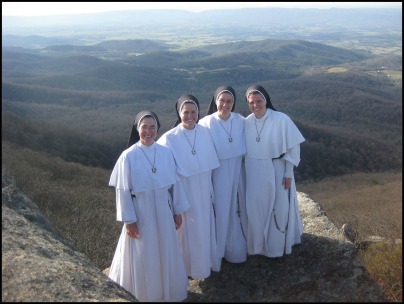| |
|
|
|
|
|
|
Nuns Now
November 04, 2016 |
If you're listening to the show right now, you are listening to a nun--our own Maureen Fiedler has been a Catholic nun since 1962. In Nuns Now we'll meet five nuns from very different backgrounds, including a cloistered nun who spends her day in quiet prayer, and a globetrotting activist whose work has taken her to scruffy border towns and even into police custody.
|
|
|
|
|
|
| Sister Judy Murray |
|
At 24, Sister Judy Murray discovered contemplative prayer, a meditative practice that helps worshippers quiet the mind and hear the still small voice of God. After about a year of praying on her own almost daily, she decided to become a Carmelite nun. Sister Murray gives us a peek into her life of simplicity, celibacy, and obedience ... and the occasional trip outside the convent.
Sister Judy Murray is a member of the Carmelite Nuns of Baltimore.
"I firmly believe that what we do puts the energy of peace and love on the currents of the universe. That it affects things. I really think that prayer energy surrounds our human family." |
|
|
|
 |
|
| Sister Miriam Holzman |
|
At the time of the Second Vatican Council in the 1960s, almost all nuns had strict daily schedules, wore religious garb, and had to ask permission from a superior to do anything out of the ordinary. Today, very few nuns retain this traditional lifestyle... but Sister Miriam Holzman was drawn to it. Sister Holzman tells us why she chose to give away virtually all her earthly possessions, including her cell phone, when she was just 24.
Sister Miriam Holzman belongs to the Dominican Sisters of Mary, Mother of the Eucharist.
"I feel that we're more free because of the way that we live our life. And that's a paradoxical thing. But people can see it when they get to know us, because they can see that we're happy."
 Sister Miriam, second from the right, on Old Rag Mountain in Virginia.
Sister Miriam, second from the right, on Old Rag Mountain in Virginia.
|
|
|
|
 |
|
| Sister Kathleen Erickson |
|
We talk to Sister Kathleen Erickson about how she assumed as a girl she would get married and live on a farm... and then became a Sister of Mercy instead. Deeply concerned about justice, peace and the poor, her work has taken her to immigration detention centers, to scruffy border towns, and even into police custody as she protested nuclear weapons.
Sr. Kathleen Erickson is a Sister of Mercy of Omaha, Nebraska.
"In some strange way, every person is called to a level of spirituality, and maybe even mysticism. It isn't just for the nuns or the priests or special people. Every person is meant to discover their own deepest, deepest connection with the God within."
|
|
|
|
 |
|
| Sister Rosemarie Milazzo |
|
Sister Rosemarie Milazzo joined the Maryknoll Community to be a religious globetrotter, imagining herself serving the poor in Africa or perhaps Peru or Japan, like other Maryknoll missionaries she knew. So she was a little surprised when she was handed her first assignment, and realized she’d be teaching in China… town. Chinatown, New York, to be exact. Sister Rosemarie did eventually travel to Tanzania, Kenya, Iraq, and a host of other countries.
Sister Rosemarie Milazzo is a member of the Maryknoll Community.
"There's a stark difference between what I experience there and what I see here. It's like a mark on your heart. It doesn't leave."
Sister Rosemarie at work in Africa.
|
|
|
|
 |
|
| Venerable Thubten Chodron |
|
Venerable Thubten Chodron takes us on her journey from jeans and dangly ear-rings to crimson robes, and even offers a meditative approach to being stuck in traffic. Having studied Tibetan Buddhism in India and Nepal, she went on to found Sravasti Abbey in Washington state, and is the only nun to have co-authored a book with the Dalai Lama. She explains why Tibetan Buddhist nuns shave their heads, forego perfume and tune out pop songs.
Thubten Chodron is a Tibetan Buddhist nun, the founder of Sravasti Abbey, and the author of several books on Buddhist philosophy and meditation.
"You look at all the other people in the cars, sitting there parked on the highway, and you think, 'All those people want to be happy and not suffer, just like I want to be happy and not suffer.'"

Venerable Thubten Chodron with His Holiness the Dalai Lama.
|
|
|
|
 |
|
|
|
|
|
|
|
|
|
|